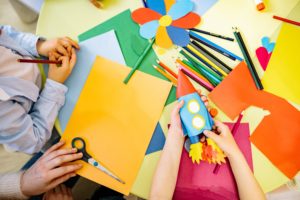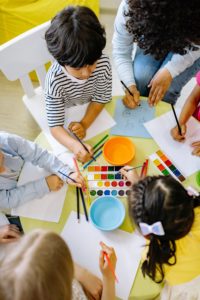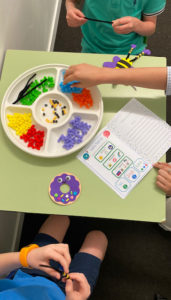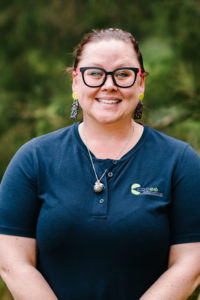Craft At Cooee In Therapy
It’s the September school holidays and at our Northside Speech Pathology and Occupational Therapy clinic, we have been running Spring Craft groups!
 As holidays roll around, there are many challenges and opportunities that they bring. Using craft can provide a language rich environment as well as provide moments of shared joy, creativity and working on various skills that are important to build during a child’s development. This can include developing descriptive language, working on fine motor skills, following directions, retelling how something was made and sharing ideas.
As holidays roll around, there are many challenges and opportunities that they bring. Using craft can provide a language rich environment as well as provide moments of shared joy, creativity and working on various skills that are important to build during a child’s development. This can include developing descriptive language, working on fine motor skills, following directions, retelling how something was made and sharing ideas.
How do you use Craft in therapy?
For Speech Pathologists, the following skills are targeted discretely during craft opportunities:
- Planning and talking about what we might make
- Following step by step or more complex directions
- Comparing and contrasting how crafts might look/feel/present
- Develop rich vocabulary relating to descriptive elements
- Retelling what was made/created
Occupational Therapists can target the following skills when using craft activities:
- Planning and sequencing
- Fine motor skills
- Executing the task according to a plan
- Locating all of the items needed to make the craft
- Some early writing or pre-writing shapes in drawing activities
What can I do at home?
 Providing an opportunity for some craft is great. A little preparation and thought may need to go into the craft initially, but will become easier the more you do it. Using materials that your child is interested in is key and important for the process, as this will help with creativity and ownership of the craft. Some ideas for craft:
Providing an opportunity for some craft is great. A little preparation and thought may need to go into the craft initially, but will become easier the more you do it. Using materials that your child is interested in is key and important for the process, as this will help with creativity and ownership of the craft. Some ideas for craft:
- Talk and discuss what you would like to make
- Try to use visualising language (what do you picture it looks like in your mind) or draw down what you’re planning on making (planning the craft!)
- Talk about what items you might need (e.g. scissors, paper, glue, toilet rolls, cotton balls) and how they look, feel, smell and work!
- Talk about the steps involved in making the plan- First we need to get some paper, then we need to use the scissors to cut some shapes…and then..finally…
- At the completion- talk about what was made and how you made it!
Why are these skills important?
Craft lends itself to be flexible and individual, providing a space for children to express their own ideas and thoughts. This is used across a number of environments as children grow (e.g. classroom, playground) and developing skills relating to craft can support in their overall communication and social engagement with their peers. Using targeted and simple crafts can build confidence and skills across areas within Speech Pathology and Occupational Therapy.
The ability to plan, organise, follow direction and retell what has been done is expected of children aged 3 and above. Supporting the fun and playfulness in developing these skills can be done through the use of craft activities, without anyone knowing. The children’s own individual interests can be included in the craft, making it more enjoyable and most of all, fun for everyone!
What does Cooee do for the craft groups?

Cooee Speech Pathology currently runs one off craft groups in the holidays, as well as some themed or structured language and craft groups throughout the term (run by a Speech Pathologist). These generally run around a theme and the children get to take their craft home with them, along with a developed activity booklet with numerous tips and information for parents to continue to support their children in developing their language and skills relating to craft. Having the physical product at the end of the craft session is a great way to support an activity retell and provide opportunities to share their creation.
Who to contact?
If you are interested in more information around Cooee’s craft groups or would like to be placed on our mailing list, please contact us at [email protected] or on 3265 4495 to speak with one of our therapists or a member of our friendly client care team.

Libby Hall
Speech Pathologist
